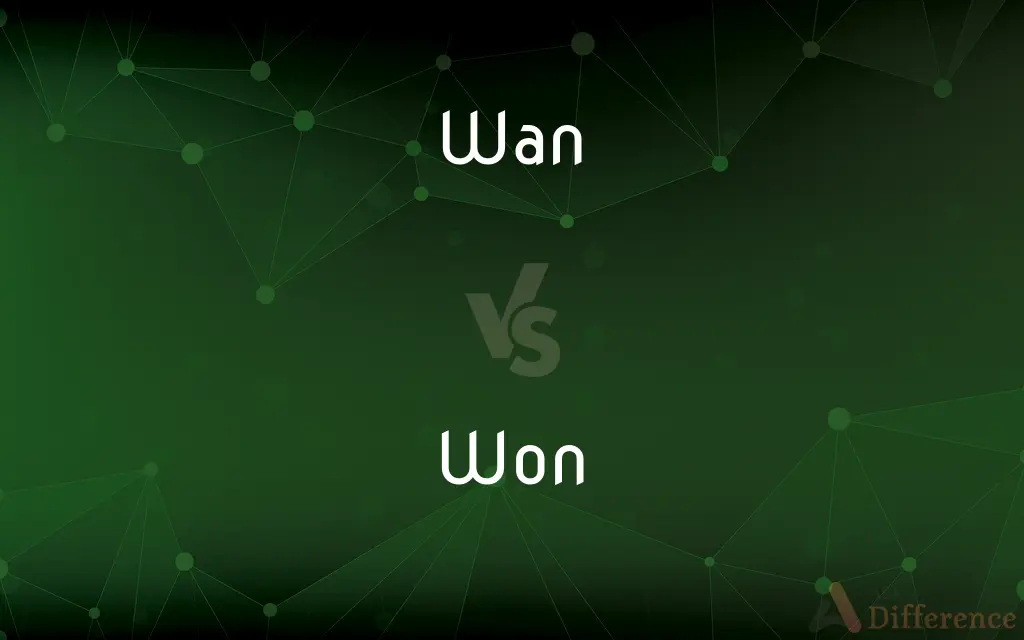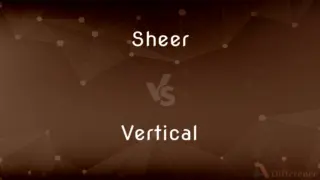Wan vs. Won — What's the Difference?
By Tayyaba Rehman & Maham Liaqat — Updated on March 27, 2024
Wan describes a pale or sickly appearance, while won is the past tense of win, indicating victory or achievement.

Difference Between Wan and Won
Table of Contents
ADVERTISEMENT
Key Differences
Wan is an adjective that describes someone’s complexion as pale, sickly, or lacking color, often suggesting physical or emotional distress. On the other hand, won is the past tense of the verb "win," used to indicate that someone has achieved victory in a competition, contest, or struggle. While wan primarily deals with physical appearance or health conditions, won relates to success or achievement in various activities or endeavors. Wan can also suggest a certain kind of aesthetic or mood, often used in literary contexts to describe environments or characters, whereas won reflects an outcome, emphasizing the result of an effort or challenge.
Wan, in its usage, often conveys a sense of delicacy, vulnerability, or exhaustion, reflecting a particular state of being or health. Won, however, highlights accomplishment and the culmination of effort, marking a moment of triumph or fulfillment. The contexts in which wan and won are used are distinctly different, with wan appearing more in descriptions of characters, settings, or moods in narrative and poetic forms, and won appearing in narratives of success, reports of competitions, and historical accounts of battles or contests.
The emotional connotations of wan and won also differ significantly. Wan often carries a melancholy or somber tone, suggesting something is lacking or diminished. Won, conversely, is associated with joy, satisfaction, and pride, invoking feelings of happiness and celebration. These contrasting emotional undertones further distinguish the terms in their respective uses and the responses they evoke from audiences.
In terms of linguistic function, wan, as an adjective, modifies nouns and pronouns, describing a characteristic or state. Won, being the past tense of a verb, denotes an action that has been completed in the past, emphasizing the achievement aspect. This functional difference is crucial for understanding the roles these words play in sentences and their impact on meaning.
While wan can be used metaphorically to describe things beyond physical appearance, such as a "wan smile" indicating a weak or insincere attempt at happiness, won is more straightforward, generally used in a literal sense to indicate a clear victory or success. This distinction underscores the versatility of wan in conveying nuanced expressions of feeling or condition, as opposed to the more direct and objective application of won.
ADVERTISEMENT
Comparison Chart
Part of Speech
Adjective
Verb (past tense)
Meaning
Pale, sickly appearance
Achieved victory or success
Usage Context
Describing appearance or mood
Indicating achievement in contests
Emotional Connotation
Melancholy, vulnerability
Joy, satisfaction
Example Sentence
"Her face was wan with illness."
"They won the championship last year."
Compare with Definitions
Wan
Dim; faint.
Only a wan light filtered through the fog at dawn.
Won
To have achieved or obtained something desirable.
She won the scholarship after years of hard work.
Wan
Suggesting or reflecting sorrow.
His eyes had a wan look after hearing the sad news.
Won
Past tense of win; to have been victorious.
They won the game in the final seconds.
Wan
Pale and giving the impression of illness or exhaustion.
Her wan face made it clear she hadn't slept well.
Won
To have gained the favor or support of someone.
The politician won over the crowd with his passionate speech.
Wan
Lacking color; washed out.
The artist preferred using wan colors to convey the bleakness of winter.
Won
To earn profit or gain an advantage.
He won big at the casino last night.
Wan
Weak or feeble.
He offered a wan smile in response to the joke.
Won
To succeed in reaching a place, especially in time.
We won the race to the top of the hill.
Wan
A communications network that uses such devices as telephone lines, satellite dishes, or radio waves to span a larger geographic area than can be covered by a LAN.
Won
To dwell or abide.
Wan
Unnaturally pale, as from physical or emotional distress.
Won
Past tense and past participle of win.
Wan
Suggestive or indicative of weariness, illness, or unhappiness; melancholy
A wan expression.
Won
See Table at currency.
Wan
To become pale.
Won
Simple past tense and past participle of win
Wan
Pale, sickly-looking.
Won
To live, remain.
Wan
Dim, faint.
Won
To be accustomed to do something.
Wan
Bland, uninterested.
A wan expression
Won
The currency of Korea, worth 100 jun in North Korea and 100 jeon in South Korea.
Wan
The quality of being wan; wanness.
Won
To dwell or abide.
This land where I have woned thus long.
Wan
Pronunciation spelling of one
Won
Dwelling; wone.
Wan
(Ireland) A girl or woman.
Won
The basic unit of money in South Korea
Wan
(obsolete) win.
Won
The basic unit of money in North Korea
Wan
Won.
Won
Not subject to defeat;
With that move it's a won game
Wan
Having a pale or sickly hue; languid of look; pale; pallid.
My color . . . [is] wan and of a leaden hue.
Why so pale and wan, fond lover?
With the wan moon overhead.
Wan
The quality of being wan; wanness.
Tinged with wan from lack of sleep.
Wan
To grow wan; to become pale or sickly in looks.
And ever he mutter'd and madden'd, and ever wann'd with despair.
Wan
A computer network that spans a wider area than does a local area network
Wan
Become pale and sickly
Wan
(of light) lacking in intensity or brightness; dim or feeble;
The pale light of a half moon
A pale sun
The late afternoon light coming through the el tracks fell in pale oblongs on the street
A pallid sky
The pale (or wan) stars
The wan light of dawn
Wan
Abnormally deficient in color as suggesting physical or emotional distress;
The pallid face of the invalid
Her wan face suddenly flushed
Wan
Lacking vitality as from weariness or illness or unhappiness;
A wan smile
Common Curiosities
Can "wan" describe emotions?
Yes, wan can describe emotions, suggesting weakness or lack of energy, e.g., a wan smile.
What does "wan" mean?
Wan refers to a pale or sickly appearance, often indicating illness or exhaustion.
Is "won" only related to sports?
No, won can relate to any form of competition, achievement, or success, not just sports.
What is the grammatical function of "won"?
Won is the past tense of the verb "win," indicating completed action.
How do the contexts of "wan" and "won" differ?
Wan often describes health or appearance, whereas won relates to achievements or victories.
What is the grammatical function of "wan"?
Wan is an adjective, used to describe nouns or pronouns.
How is "won" used in a sentence?
Won is used to indicate past victory or achievement, e.g., "She won the competition."
Can "won" imply financial gain?
Yes, won can imply financial gain or advantage, e.g., winning a bet.
Can "wan" be used metaphorically?
Yes, wan can be used metaphorically to describe things that are weak, faded, or lacking vitality.
Is "wan" always negative?
While often used in negative contexts, "wan" can also convey a delicate or subtle aesthetic.
Can "won" be used to describe gaining support?
Yes, won can describe gaining someone's favor or support, e.g., winning over an audience.
How does "won" reflect on achievement?
Won reflects positively, highlighting success, victory, or accomplishment.
Are there synonyms for "wan" that convey a similar meaning?
Yes, synonyms include pale, ashen, or sickly, all suggesting a lack of color or vitality.
What are some synonyms for "won"?
Synonyms for won include triumphed, prevailed, or succeeded, all indicating victory or success.
Does "wan" have a specific emotional tone?
Wan typically carries a melancholy or somber tone, suggesting sadness or lack of energy.
Share Your Discovery

Previous Comparison
Dusty vs. Rusty
Next Comparison
Sheer vs. VerticalAuthor Spotlight
Written by
Tayyaba RehmanTayyaba Rehman is a distinguished writer, currently serving as a primary contributor to askdifference.com. As a researcher in semantics and etymology, Tayyaba's passion for the complexity of languages and their distinctions has found a perfect home on the platform. Tayyaba delves into the intricacies of language, distinguishing between commonly confused words and phrases, thereby providing clarity for readers worldwide.
Co-written by
Maham Liaqat














































